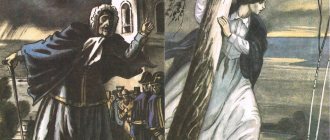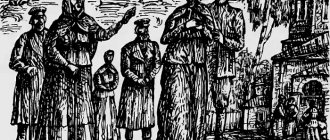- Essays
- On literature
- Ostrovsky
- The theme of sin and repentance in the play The Thunderstorm
Sin is different for everyone. There is no unique concept of sin. Every person has done it at least once. After all, people are not sinless. When a person offends another, he also commits a sin. He feels guilty and remorseful. Atonement for guilt is repentance.
A fairly clear example of one of the sins can be seen in the drama by A.N. Ostrovsky's "The Thunderstorm", using the example of the main character Katerina.
Treason, what does it mean and what can it entail? For Katerina, she turned out to be destructive and sinful. As a result, she could not survive and lose her life.
In life, Katerina is a bright and kind girl who could not control herself. But she had her reasons. She got married when she was a very young girl. The mother-in-law was not the most loyal woman; she did not respect her daughter-in-law and considered her son’s property, as if she were just a thing in their house.
Is it possible to condemn Katerina for such an impulse of the soul that visited her heart? She just wanted a feeling of full rights in this story with Boris. She understood that what she had done was a sin that she could not forgive herself. But she asked to go with Tikhon, she didn’t want to stay. I understood that a sin could be committed.
Katerina tried so hard not to throw herself into the unconscious abyss of passion that dominated her. But love, which was this abyss, became a real sin for the young girl.
In family life, she was as if in a cage. And with Boris she was able to feel alive and free. Loving and beloved. After all, her soul needed this harmony and love so much.
But no matter how good it was for Katerina, she still committed a sin. He stroked her and pulled her like a load, lower and lower.
Having found one way out, seeing heavenly punishment in the thunderstorm, she decides to repent, but after confessing, everyone rejected and despised her. But did they have the right to do so? Perhaps even with such sin, she would have been much purer than those who condemned her most.
Seeing no other way out, she decides to commit another sin, which cannot even be compared with the previous one. She throws herself into the Volga in agony, deliberately taking her own life.
At the end of the drama, he dies along with Katerina, with the one who dared to throw herself into the despair of her life, which brought her love and freedom, but committing a sin. but the environment of that world is also perishing, which did not understand that such love and freedom is not afraid even of sin and destructive repentance.
Sin in Ostrovsky's Thunderstorm
The work raises the theme of sin and repentance. This topic remains relevant to this day. After all, a person’s life is full of disappointments when he has to come to terms with something, accept the fact that he needs to move on with his life. But sometimes this is very difficult to do. The situations in which a person finds himself can be completely different. But they all depend on one thing: what decision a person makes - will he take a desperate step or resign himself.
The main character of the work is Katerina, a young girl, Tikhon’s wife. She has an easy-going character and was brought up in patriarchal ways. But the fate of the girl, whose image appears to us pure and bright, is very difficult. The situation in which Katerina finds herself is shocking. The constant reproaches of her mother-in-law, Kabanova, a rude and despotic woman, injustice and Tikhon’s betrayal lead to the fact that the girl cannot come to terms with her fate. No matter how hard she tried to improve family relationships, nothing worked. And then the heroine, in the hope of happiness, indulges in a feeling of love for another - Boris. But the problems are not getting smaller; pangs of conscience haunt the girl. She constantly wonders whether she should confess to her husband. And yet Katerina can no longer hide her sin and tells everything to her mother-in-law and husband. This causes reproaches and scolding from the mother-in-law, who instructs her son to beat his wife... Even Boris, who, as the girl thought, could save her from torment, leaves for Siberia, fearing publicity from people. All this forces the heroine to make a fatal decision - to rush into the Volga. She is not afraid that this is a sin, because she cannot come to terms with her fate, accept the fact that she will not be happy, although she could constantly please her mother-in-law and become her husband’s slave. The only salvation for her is death.
In conclusion, I would like to say that sometimes a person’s choice depends on the situation in which he finds himself. The theme of despair and humility is evident in this work. The fate of the unfortunate girl Katerina and her tragic end confirm that coming to terms with anything can be very difficult and sometimes a desperate act may be the only way out.
Essay on the topic: The theme of sin, retribution and repentance in Ostrovsky’s drama “The Thunderstorm”
Composition. The theme of sin, retribution and repentance in the drama by A. N. Ostrovsky “The Thunderstorm”
The theme of sin, retribution and repentance is highly traditional in Russian classical literature. Suffice it to recall such works as “The Enchanted Wanderer” by N.S. Leskova, “Who Lives Well in Rus'” by N.A. Nekrasov, “Crime and Punishment” by F.M. Dostoevsky and many others. Of course, the emergence of this topic in Russian literature is not accidental - it is a reflection of the Christian worldview, the principles of religious morality inherent in the most diverse segments of the population of Russia in the 19th century. The same theme is developed in his socio-psychological drama “The Thunderstorm” by A.N. Ostrovsky, one of the outstanding masters of Russian drama. The drama "The Thunderstorm", written in 1859 on the basis of real life impressions, paints a vivid picture of the life of a provincial Volga city, a bourgeois-merchant environment. The main character, Katerina, is the wife of the merchant Tikhon Kabanov. She is an extraordinary person - sincere, incapable of hypocrisy, freedom-loving and natural. It is difficult for such a heroine to get along in a family where everyone obeys a domineering, despotic mother, where a weak-willed and spineless husband cannot serve as support and protection for her. But Katerina is also deeply religious. This alone constitutes the contradiction between the freedom-loving, open nature of the heroine and the preaching of Christian humility and patience. The motive of the thunderstorm, Katerina’s unreasonable fear of this natural phenomenon, is also connected with this: she is afraid not of death, but of the fact that she will die without repentance, without having time to properly perform all the necessary religious rituals. The scary thing is “that death will suddenly find you as you are, with all your sins, with all your evil thoughts,” admits Katerina Varvar. She considers her nascent love for Boris a “terrible sin,” trying to break and deceive herself, that she will only love her husband. The scene of Tikhon's departure is decisive for the further development of the action. Katerina was rudely humiliated by her mother-in-law, Tikhon did not understand and pushed her away, and led Varvara into temptation, giving away the key to the gate. The author, as a master of psychological analysis, reveals the heroine’s state of mind: why she, well aware of the sinfulness and forbiddenness of her love, is unable to resist it. She clearly understands that she has “ruined” her soul, and for her this is the most terrible tragedy. In this, Katerina is contrasted with all the other characters - Varvara, Kudryash, Boris himself, for whom the main thing is a secret, so that everything is “sealed and covered”, so that “no one knows” about this love. Katerina is not interested in the opinions of others, public reputation - all this is petty and insignificant compared to the tragedy of a soul ruined by mortal sin. “If I was not afraid of sin for you, will I be afraid of human judgment?” - she says to Boris. Therefore, “The Thunderstorm” is not so much a tragedy of love as a tragedy of conscience, the collapse of the heroine’s inner world, forced to live by the rules of hypocritical public morality. The morality of society and truly religious morality are different things, as the author shows us. And as a true believer, Katerina could not pretend in front of her husband that nothing had happened: she was in a state close to hysteria, so much so that even Kabanikha felt something was wrong. In the scene of Katerina’s public repentance, Ostrovsky again shows himself to be a subtle psychologist: he again connects the heroine’s state of mind with the motif of a thunderstorm, and we see how every seemingly little thing affects the further outcome of events. Random remarks from passers-by, threats from a crazy lady, a fresco on the wall of the chapel - all this drop by drop fills the heroine’s patience, and she falls to her knees, confessing to the sin she has committed. Again, the contrast between a truly believing soul and the hypocritical behavior of ordinary people is revealed. The most important thing for Tikhon is to hide everything from his mother, and for Marfa Ignatyevna it is to prove that she is right. Now Katerina becomes an outcast from society: everyone laughs in her eyes, reproaches her “at every word.” There is no place for forgiveness or mercy. In response to Kuligin’s words that enemies need to be forgiven, Tikhon replies: “Go, talk to your mother, what will she tell you about this.” Boris Grigorich is also weak, unable to protect Katerina. The poor woman dreams of her last date, considering only herself to blame for everything. She dreams of death as a release from torment; now she doesn’t care: “I’ve already ruined my soul.” And having said goodbye to Boris, she realizes even more clearly that she has no reason to live anymore: she is disgusted with the house, its walls, and people. An already ruined soul is indifferent to the sin of suicide; what is much more important to it is that “you cannot live.” Katerina’s suicide was regarded in criticism in different ways: both as a protest of the individual against the foundations of the “dark kingdom” (NA. Dobrolyubov), and as simply stupidity (D.I. Pisarev). But we can probably talk about the tragedy of a truly religious person in a world of generally accepted hypocritical morality, where sin is simply covered up by external appearances and lies, and there is no place for forgiveness and mercy. Katerina paid dearly for her originality, exclusivity, and desire for love and happiness. Will retribution come to this society for its lost soul? Can Tikhon’s words, thrown to his mother in anger, be considered an epiphany: “Mama, you ruined her...” It is unlikely that anything will change in the life of the city of Kalinov, although the revolutionary democrats claimed that in “The Thunderstorm” there is a clear sense of “something refreshing and encouraging” (N.A. Dobrolyubov). But the character of the main character, a sincere, bright personality, capable of selfless love and dedication, has become one of the brightest characters in Russian drama and arouses the sympathy of readers, even despite the fact that the heroine is a sinful, lost soul. .
novstudent.ru | 10/20/2012
The problem of repentance in A. N. Ostrovsky’s play “The Thunderstorm”
Violation of oral or written norms is a sin and must be punished. If at first a person was afraid of being killed for sins, then later he begins to worry about his afterlife. A person begins to worry about what awaits his soul after death: eternal bliss or eternal suffering. You can end up in blissful places for righteous behavior, that is, observing norms, but sinners end up in places where they will suffer forever. This is where repentance arises, since a rare person could live without committing sins. Therefore, it becomes possible to save yourself from punishment by begging God for forgiveness. Thus, any person, even the last sinner, receives hope of salvation if he repents.
In "The Thunderstorm" the problem of repentance is especially acute. The main character of the tragedy, Katerina, experiences terrible pangs of conscience. She is torn between her legal husband and Boris, a righteous life and moral failure. She cannot forbid herself to love Boris, but she executes herself in her soul, believing that by doing this she is rejecting God, since a husband is to his wife as God is to the church. Therefore, by cheating on her husband, she betrays God, which means she loses all possibility of salvation. She considers this sin unforgivable and therefore denies the possibility of repentance for herself.
Katerina is very pious, since childhood she was accustomed to pray to God and even saw angels, which is why her torment is so strong. These sufferings bring her to the point where she, fearing God’s punishment (personified by a thunderstorm), throws herself at her husband’s feet and confesses everything to him, putting her life in his hands. Everyone reacts differently to this recognition, revealing their attitude towards the possibility of repentance. Kabanova offers to bury her alive in the ground, that is, she believes that there is no way to forgive her daughter-in-law. Tikhon, on the contrary, forgives Katerina, that is, he believes that she will receive forgiveness from God.
Katerina believes in repentance: she is afraid of sudden death, not because her life will be interrupted, but because she will appear before God unrepentant and sinful.
People's attitude towards the possibility of repentance is manifested during a thunderstorm. A thunderstorm represents the wrath of God, and therefore, when people see a thunderstorm, they look for ways of salvation and behave in different ways. For example, Kuligin wants to build lightning rods and save people from thunderstorms; he believes that people can be saved from God's punishment if they repent, then the wrath of God will disappear through repentance, just as lightning goes into the ground through a lightning rod. Dikoy is sure that it is impossible to hide from the wrath of God, that is, he does not believe in the possibility of repentance. Although it should be noted that he can repent, since he throws himself at the man’s feet and asks for forgiveness from him for cursing him.
Pangs of conscience bring Katerina to the point that she begins to think about suicide, which the Christian religion considers one of the most serious sins. Man seems to reject God, so suicides have no hope of salvation. Here the question arises: how was such a devout person like Katerina able to commit suicide, knowing that by doing so she was ruining her soul? Maybe she didn’t really believe in God at all? It must be said that she considered her soul already ruined and simply did not want to continue living in pain, without hope of salvation.
She faces Hamlet's question - to be or not to be? Should I endure torment on earth or commit suicide and thereby end my suffering? Katerina is driven to despair by the attitude of people towards her and the torment of her own conscience, so she rejects the possibility of salvation. But the denouement of the play is symbolic: it turns out that the heroine has hope of salvation, since she does not drown in the water, but is broken on an anchor. The anchor is similar to the part of the cross, where the base represents the Holy Grail (the cup containing the blood of the Lord). The Holy Grail symbolizes salvation. Thus, there is hope that she was forgiven and saved.
Sin in “The Thunderstorm” by Ostrovsky (theme of sin and repentance)
(310 words) Plays by the famous Russian playwright A.N. Ostrovsky became the basis of Russian drama, giving the theater a rich repertoire and deep, truly heartfelt characters. Ostrovsky's psychological dramas are associated with issues of a philosophical, social and universal nature. Thus, the theme of the Fall in the drama “The Thunderstorm” forces the reader to trace the complex path of human choice in conditions of spiritual unfreedom, referring us to the religious categories of sin and repentance.
The heroes of Ostrovsky's plays are in conditions of choice bordering on recklessness and moral failure, in which, however, the true tragedy of life is revealed. Katerina commits a moral fall, for which a receptive reader has been trying to find an explanation for a century and a half, perceiving her betrayal as an attempt at rebellion, a search for happiness, or a manifestation of spiritual instability. The image of Katerina is usually assessed in different ways, however, the sinfulness of the heroine’s actions cannot be denied. This woman is deeply religious, but her faith is based on fear. For religious reasons, the bond of marriage cannot be broken. The marriage union of two people is inviolable, and adultery is a sin. It is not surprising that Katerina is afraid of God's punishment, because she violates the ban by allowing herself a sincere, but illegal impulse. Love for Boris becomes a sin for her, which she tries to resist. But the thirst for authentic life, unlimited by the prohibitions and traditions of the dense Kalinov, takes precedence over the fear of essentially fair punishment.
Love becomes for Katerina the cause of fall and death, on the one hand, and on the other, the awareness of the limitless possibilities of her own personality. A sixteen-year-old girl, deprived of the possibility of self-expression, but sensitive and impetuous by nature, is forced to lead a miserable existence in humiliation and humility, with an unloved husband, under the strict supervision of her mother-in-law. Marriage to Tikhon devalues Katerina’s life, but betrayal gives an incentive to live, because the heroine is trying to find legitimate happiness with Boris. When the attempt fails, Katerina is ready to be punished for what she has done, choosing suicide as a way of repentance, and perhaps liberation. The thunderstorm becomes a symbol of God's punishment for treason and suicide.
The tragic ending of the play largely indicates the impossibility of happiness built on sin, but this is only one of the possible interpretations of the ending. The death of Katerina is the death of an opposing hero who turned out to be powerless in the face of the triumphant inertia in the world.
Author: Valeria Pronina
Interesting? Save it on your wall!





